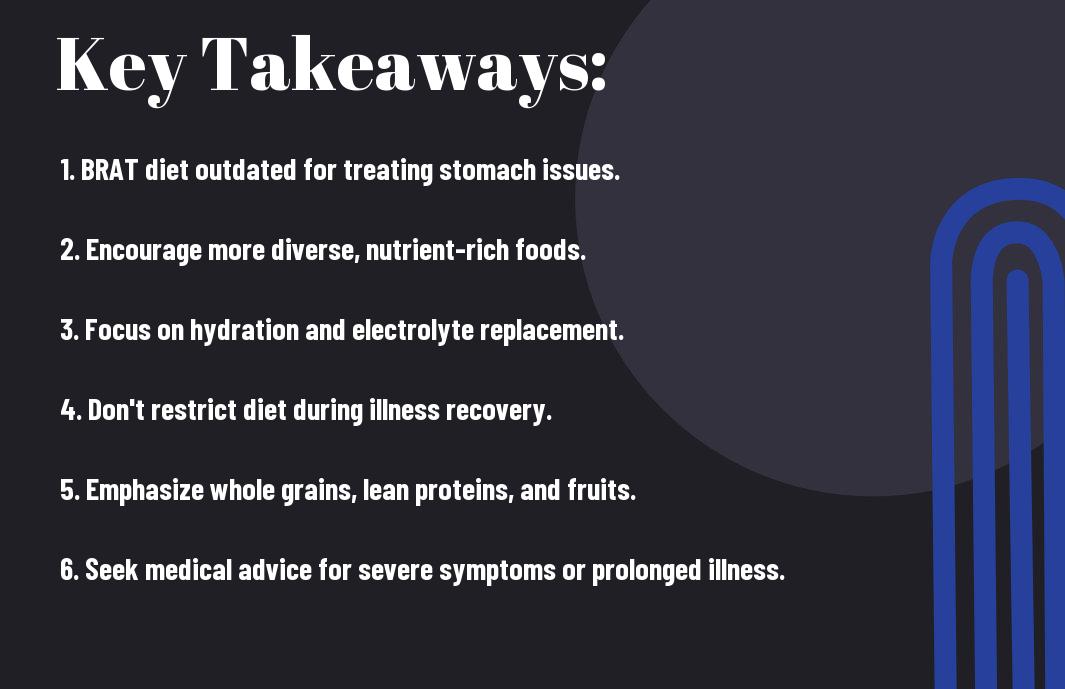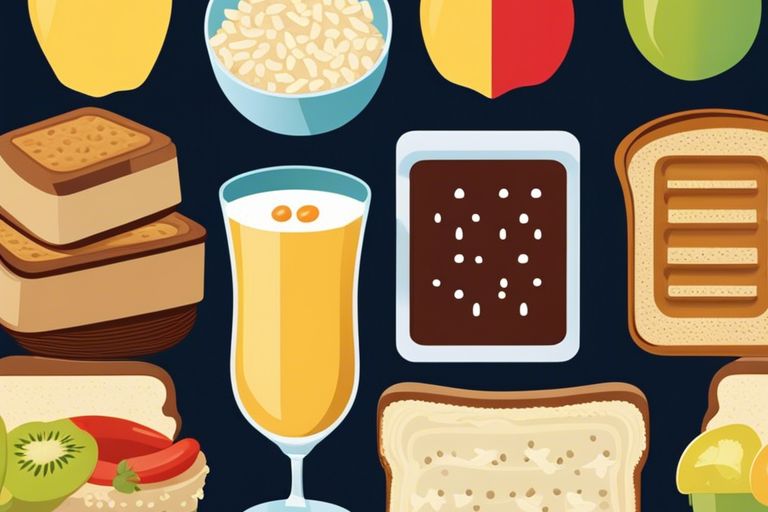There’s a long-held belief that the BRAT (Bananas, Rice, Applesauce, Toast) diet is the go-to solution for easing digestive issues like diarrhea and stomach upset. However, recent research and medical experts are now challenging this conventional wisdom. In this post, we’ll investigate into why the BRAT diet may not be the best choice for recovering from gastrointestinal disturbances and explore alternative recommendations to help you or your loved ones bounce back to health faster and more effectively.

Table of Contents
Rethinking the BRAT Diet
Contemporary Nutritional Science Perspective
Little research has been done in recent years to support the effectiveness of the BRAT diet in managing gastrointestinal issues. While the diet may have been popular in the past for easing digestive problems, it lacks necessary nutrients needed for recovery and may not provide adequate nourishment.
Pitfalls and Limitations of the BRAT Diet
For those looking to rely solely on the BRAT diet for recovery, it is important to consider its limitations. The diet is low in protein, healthy fats, and fiber, which are crucial for overall health and recovery. Strict adherence to the BRAT diet may lead to nutrient deficiencies and prolonged illness.
BRAT stands for bananas, rice, applesauce, and toast – the staple foods recommended for individuals suffering from gastrointestinal issues. While these foods are easy on the stomach and may help alleviate symptoms in the short term, they do not provide the necessary nutrients for a balanced diet. It is important to consult with a healthcare professional for a more comprehensive and nourishing approach to recovery.
Alternative Dietary Approaches
The Role of a Diverse Diet in Recovery
Clearly, the BRAT diet has been a go-to recommendation for managing digestive issues. However, it may not provide all the necessary nutrients for a speedy recovery. Research shows that incorporating a diverse range of foods can help restore balance in the gut and support overall health. While bland foods like bananas, rice, applesauce, and toast can be soothing, they may not provide the vital vitamins, minerals, and antioxidants needed for optimal healing.
Incorporating New Foods and Probiotics
Any dietary approach aiming for improved gut health should consider incorporating new foods and probiotics to promote the growth of beneficial bacteria in the digestive system. Probiotics are live microorganisms that can offer a range of health benefits, including improved digestion, enhanced immunity, and reduced inflammation.
With that in mind, it’s important to introduce new foods gradually to assess tolerance and prevent exacerbating symptoms. For instance, foods rich in fiber, such as whole grains, fruits, and vegetables, can help regulate digestion and support the growth of healthy gut bacteria. Probiotic-rich foods like yogurt, kefir, sauerkraut, and kimchi can also aid in restoring gut flora balance.

Implementing Changes in Dietary Recommendations
Educating Healthcare Professionals
The key to implementing changes in dietary recommendations lies in educating healthcare professionals about the shortcomings of traditional approaches like the BRAT diet. Healthcare professionals need to be updated on the latest evidence-based practices that promote quicker recovery and improved outcomes in patients with gastrointestinal issues. By providing them with the necessary tools and knowledge, they can confidently recommend more effective and balanced dietary plans.
Patient-Centered Approaches to Gastrointestinal Recovery
An vital aspect of implementing changes in dietary recommendations is to shift towards patient-centered approaches to gastrointestinal recovery. By involving patients in the decision-making process and considering their individual needs and preferences, a more personalized and sustainable dietary plan can be created. This approach fosters a sense of empowerment and compliance, leading to better overall health outcomes.
Gastrointestinal recovery can be a challenging process, but by focusing on a patient-centered approach, healthcare professionals can guide individuals towards a balanced diet that nourishes the body while promoting healing. By addressing individual needs, preferences, and cultural considerations, patients are more likely to adhere to dietary recommendations and experience faster recovery.
Summing up
Considering all points, it is clear that the traditional BRAT diet may not be the most effective approach for managing gastrointestinal illnesses. Instead, incorporating a wider variety of easily digestible and nutrient-rich foods can provide the necessary nutrients for recovery and help prevent potential nutritional deficiencies. Remember to stay hydrated, focus on bland and easily digestible foods, and listen to your body’s needs when dealing with stomach-related issues. Always consult a healthcare professional for personalized advice and treatment options.
FAQ
Q: What is the BRAT diet?
A: The BRAT diet is a traditional dietary approach often recommended for individuals suffering from digestive issues, such as diarrhea or vomiting. It stands for Bananas, Rice, Applesauce, and Toast.
Q: Why is the BRAT diet considered outdated?
A: The BRAT diet is considered outdated because it lacks imperative nutrients and can lead to inadequate caloric intake and potential nutritional deficiencies. It is now recommended to focus on a more balanced and varied diet to promote overall health and recovery.
Q: What are the alternatives to the BRAT diet?
A: Health professionals now suggest consuming a diet that includes a variety of easily digestible foods such as plain yogurt, boiled potatoes, smooth nut butter, and well-cooked vegetables. Staying hydrated with water, herbal teas, and electrolyte-rich beverages is also imperative for recovery.
 hqsportz Personal Website | Tell Information about Sport, Fashion And Health
hqsportz Personal Website | Tell Information about Sport, Fashion And Health



